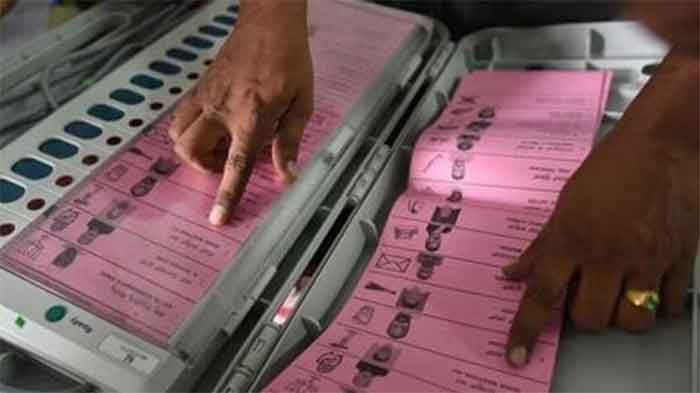
To
Shri Rajiv Kumar
Chief Election Commissioner
Shri A C Pandey
Election Commissioner
Shri Arun Goel
Election Commissioner
Dear S/Shri Rajiv Kumar/ Pandey/ Goel,
I refer to the Commission’s proposal to introduce Remote EVMs to enable migrant workers to cast their votes in their home constituencies.
While the Commission’s effort to include migrant workers in the electoral process is commendable, I have the following general concerns about the lack of transparency in the Commission’s functioning and violation of the secrecy of voting, in addition to the concerns about the way migrant workers are to be enfranchised.
- The bedrock of our electoral process, as envisaged in the Representation of the People Act, 1951 (RPA51) is the secrecy of voting. At the same time, Article 19 of the Constitution requires transparency of the process, from the voter’s point of view. If these two conditions are not 100% fulfilled, I am afraid that whatever the Commission may do, whether it is an upgradation of technology or enhancing the efficiency of the electoral process, the process itself would continue to be legally questionable in respect of both these requirements. On both these counts, there are serious concerns that the Commission has not fully addressed till date.
- In so far as secrecy of voting, as envisaged in Section 128 of the RPA51, is concerned, the old-time paper ballot system enabled the Returning Officers to maintain booth-wise secrecy by mixing the ballots before counting, making it difficult for anyone to know the booth-wise pattern of voting. This is important in the Indian context, as there is a strong correlation between the location of a booth and the distribution of communities, caste wise, language-wise or religion-wise. Ever since the paper ballot system was given up and replaced by the Electronic Voting Machines (EVMs), such mixing is technologically not possible, as admitted by the Commission, “through the use of a device called ‘Totalizer’ which can accommodate upto 14 Control Units at a time to aggregate votes without revealing the candidate-wise count of individual used at a particular polling station. However, totalizers are not in use at present as its technical aspects and other related issues are under examination and it is also the subject of a court case” (https://eci.gov.in/faqs/evm/general-qa/electronic-voting-machine-r2/). Once the secrecy requirement is infringed thus, the voters become vulnerable to threats, undue incentives and so on, which unduly impact the way they vote or not vote. This in itself vitiates the electoral process, which is based on the EVMs technology. From what one sees across the country these days, this is happening on a large scale.
- The second statutory requirement is the need to maintain 100% transparency in respect of every stage of the electoral process, from the voter’s point of view. There are multiple ways in which such an important requirement is infringed by the Commission, and the same are listed below.
- The EVM technology: In principle, no technology is 100% infallible. More so in the case of the EVMs. Usually, more advanced technologies come at the cost of transparency for the public. In the words of Shri G V L Narasimha Rao, a sitting BJP Member of the Parliament, who made this observation in 2010: “If this important issue of EVMs and election reform has not found salience so far, it is largely because of the mystique around technology in the popular mind, and the Election Commission’s resoluteness in keeping all relevant information out of the public domain.”(http://www.indianevm.com/book_democracy_at_risk_2010.pdf). Many segments of the manufacture of the EVMs, touted by the Commission to be based on “advanced” technologies, continue to be opaque to the voter. Page 17 of the latest Status Paper on EVMs mentions that the “programme (machine code) is burnt into the chips at the PSU (BEL) premises itself” and admits that “microcontrollers are procured from manufacturers abroad” but the voter is not fully taken into confidence on the kind of machine code that has been evolved, and the names of the overseas sources of the microcontrollers. On the one hand, as the EVM technology gets upgraded, on the other hand, transparency for the voter is getting diminished, in violation of Article 19. A technology that remains opaque has no place in our election system. Transparency in the electoral system is far more important than anything else.
- A far more serious issue is the conflict of interest in the case of the CPSE, Bharat Electronics Ltd (BEL), on whose credentials the integrity of the entire electoral system based on the EVM technology so precariously rests. The BEL, as a premier CPSE par excellence, has outstandingly competent technical personnel. Their credentials are unquestionable. However, the ruling political party at the Centre has appointed at least three Directors on BEL’s Board of Directors, Shri Mansukhbhai Shamjibhai Khachariya (https://myneta.info/ls2009/candidate.php?candidate_id=2175& https://psuwatch.com/bel-announces-appointment-five-independent-directors-on-its-board)/,
Dr P V Parthasavrathi (https://myneta.info/loksabha2019/candidate.php?candidate_id=5052) and Dr Shiv Nath Yadav (https://myneta.info/up2007/candidate.php?candidate_id=448). If this information is factually correct, since appointment of persons with political affiliations violates the CPSE guidelines, it is highly objectionable. I sincerely hope that this information gathered from the public domain is not factually true. If it is factually true, while I have the highest respect for each one of these three individuals, and I have no intention whatsoever to question their integrity in any manner, nevertheless, I feel seriously concerned about the possible conflict of interest that arises from this, in the management of such an excellent CPSE, directly involved in developing the source code for operating the EVMs, around which the vulnerability or otherwise of the EVMs so critically revolves. This has clearly tilted the level-playing ground between the political parties, in favour of the ruling political executive. I would not be surprised if similar political appointments have been made to the Board of the other CPSE associated with the manufacture of the EVMs, namely, the Electronic Corporation of India Ltd (ECIL). - The Election Commission so far has been waxing eloquent on the infallibility of the EVMs, entirely basing its arguments on the fact that the EVMs are manufactured by two CPSEs, arguing that the process is 100% safe, whereas it has conveniently kept the voters in the dark on the involvement of the ruling political party in the top management of at least one of the two CPSEs. The Commission has not only acquiesced in the political executive thus tilting the level-playing ground in favour of itself, in the matter of management of the CPSE that manufactures the EVMs, but also kept the voters in the dark about the conflict of interest angle. On this ground alone, the use of the BEL-manufactured EVMs in the elections gets totally vitiated and therefore should straightaway be dropped. The ECI should clarify openly in the public domain, as to how it has remained a mute spectator to this. In addition to being complicit to the opacity in the use of the EVM technology for the voter, the ECI has also been a party, deliberate or otherwise, to an element of bias being introduced in favour of the ruling party in the case of manufacture of the EVMs.
- There are other serious concerns that have arisen on whether the ECI has been transparent and objective in conducting elections in recent times. The Commission has not provided any satisfactory answers on why it had unduly delayed announcement of the recent Gujarat elections, its passive indifference to the the Union Finance Ministry opening a window for Electoral Bonds to open the floodgates to corporate donations, apparently meant to benefit itself during the Gujarat assembly elections, and its reluctance to be transparent with reference to complaints made by some of us against a senior public functionary on the violation committed in respect of the Model Code of Conduct (MCC) during the same Gujarat elections. My letters accessible at https://countercurrents.org/2022/11/electoral-bond-notification-in-violation-of-model-code-of-conduct-ec-must-intervene/?swcfpc=1, http://eassarma.in/sites/default/files/public/MCC-Gujarat-Letter-dated_26-11-2022-to-CEC.pdf, http://eassarma.in/sites/default/files/public/Letter-to-ECI_28-11-2022.pdf, http://eassarma.in/sites/default/files/public/Letter-to-ECI-Gujarat_2-12-2022.pdf, are self-explanatory.
- Is the ECI fully committed to maintaining transparency vis-a-vis the voters and the public? Has the ECI instilled enough public trust in its own commitment to fairness in conducting elections? As a quasi-judicial authority, the ECI is required to function in full public view and pass well-reasoned orders, which the complainants can contest, if necessary. I am afraid that the way the Commission had dealt with our complaints did not inspire confidence in this respect.
- While the nation will and should welcome any effort to enfranchise millions of migrant workers, how will the Commission insulate the process from undue inducements, threats posed to the migrant voters? How will the Commission enforce the enforcement of the MCC in respect of the migrant workers working in different States? Will the Commission guarantee counting of 100% VVPATs to inspire public confidence in the process, keeping in view the fact that Rule 56D(4)(b) inserted in 2013 in the Conduct of Election (Amendment) Rules accords primacy to paper trail in preference to votes counted with the help of the EVMs? I would refer you in this connection to an excellent analytical article authored by Shri M G Devasahayam (https://thewire.in/government/before-celebrating-remote-voting-ec-should-address-longstanding-questions-on-the-evm), raising serious, valid concerns about the use of Remote EVMs for migrants. The Commission should go through that article carefully and provide answers in the public domain to each one of his questions.
- I refer to the apprehensions voiced recently by Prof Rajat Moona, a member of the Technical Advisory Committee for the EVMs (https://indianexpress.com/article/india/chip-shortage-poses-major-challenge-to-eci-before-2024-polls-iitgn-director-8192225/) on the emerging shortage of chips for the new generation M3 EVMs and the fact that the Commission may have to look to multiple sources in Europe and some Asian countries for meeting the likely demand of more than 13-15 lakh EVMs for the 2024 general elections, which will make it difficult for the Commission to avoid questionable sources that could impact the integrity of the electoral process in many ways. In the US and other countries, there have been external interventions in domestic elections and the Commission cannot afford to be lax in that respect. If the Commission cannot assure the integrity of the source of the chips required for the M3 EVMs, it should refrain from going ahead with the use of those machines, in which case, it will be forced to fall back on the older generation EVMs. In the case of the latter, one is not certain about the likelihood of external agencies being involved in the process of burning the software into the chip. In any case, microcontrollers are imported from foreign sources and one is never sure about their credentials from the point of view of interference from external agencies. In all these matters, unless the political parties and the voters are fully taken into confidence, the process will get vitiated on the ground that it is not transparent.
All these concerns are of a serious nature and the Commission cannot afford to brush them aside. The Commission should discuss these issues with the political parties and the public at large, as they have long-term implications from the public interest point of view.
I hope that each one of you will ponder over these issues carefully and take the public into confidence that the Commission would not do anything that violates Article 19 and that infringes the secrecy of voting, as envisaged in the Constitution and in the election law.
Regards,
yours sincerely,
E A S Sarma
Visakhapatnam
Visakhapatnam









































